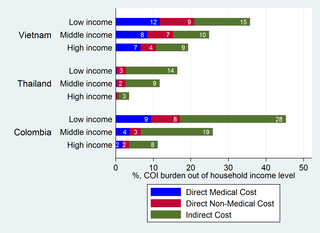PLOS Neglected Tropical Diseases ( IF 3.8 ) Pub Date : 2017-10-30 , DOI: 10.1371/journal.pntd.0006037 Jung-Seok Lee , Vittal Mogasale , Jacqueline K. Lim , Mabel Carabali , Kang-Sung Lee , Chukiat Sirivichayakul , Duc Anh Dang , Diana Cristina Palencia-Florez , Thi Hien Anh Nguyen , Arthorn Riewpaiboon , Pornthep Chanthavanich , Luis Villar , Brian A. Maskery , Andrew Farlow

|
Background
Dengue fever is a major public health concern in many parts of the tropics and subtropics. The first dengue vaccine has already been licensed in six countries. Given the growing interests in the effective use of the vaccine, it is critical to understand the economic burden of dengue fever to guide decision-makers in setting health policy priorities.
Methods/Principal findings
A standardized cost-of-illness study was conducted in three dengue endemic countries: Vietnam, Thailand, and Colombia. In order to capture all costs during the entire period of illness, patients were tested with rapid diagnostic tests on the first day of their clinical visits, and multiple interviews were scheduled until the patients recovered from the current illness. Various cost items were collected such as direct medical and non-medical costs, indirect costs, and non-out-of-pocket costs. In addition, socio-economic factors affecting disease severity were also identified by adopting a logit model. We found that total cost per episode ranges from $141 to $385 for inpatient and from $40 to $158 outpatient, with Colombia having the highest and Thailand having the lowest. The percentage of the private economic burden of dengue fever was highest in the low-income group and lowest in the high-income group. The logit analyses showed that early treatment, higher education, and better knowledge of dengue disease would reduce the probability of developing more severe illness.
Conclusions/Significance
The cost of dengue fever is substantial in the three dengue endemic countries. Our study findings can be used to consider accelerated introduction of vaccines into the public and private sector programs and prioritize alternative health interventions among competing health problems. In addition, a community would be better off by propagating the socio-economic factors identified in this study, which may prevent its members from developing severe illness in the long run.
中文翻译:

登革热经济负担的多国研究:越南,泰国和哥伦比亚
背景
登革热是热带和亚热带许多地区的主要公共卫生问题。第一种登革热疫苗已在六个国家获得许可。鉴于对有效使用疫苗的兴趣与日俱增,至关重要的是了解登革热的经济负担,以指导决策者确定卫生政策的重点。
方法/主要发现
在三个登革热流行国家:越南,泰国和哥伦比亚进行了标准化的疾病成本研究。为了掌握整个疾病期间的所有费用,在临床就诊的第一天对患者进行了快速诊断测试,并安排了多次访谈,直到患者从当前疾病中康复为止。收集了各种成本项目,例如直接医疗和非医疗成本,间接成本和非自付费用。此外,还通过采用logit模型确定了影响疾病严重程度的社会经济因素。我们发现住院的每集总费用从141美元到385美元不等,门诊患者从40美元到158美元不等,其中哥伦比亚最高,泰国最低。登革热的私人经济负担百分比在低收入人群中最高,而在高收入人群中最低。Logit分析表明,早期治疗,接受高等教育和提高对登革热疾病的了解将降低患上更严重疾病的可能性。
结论/意义
在这三个登革热流行国家,登革热的成本很高。我们的研究结果可用于考虑将疫苗加速引入公共和私营部门计划,并在竞争性健康问题中优先选择替代性健康干预措施。此外,通过传播本研究中确定的社会经济因素,一个社区会更好,这可能会阻止其成员长期患上严重疾病。


























 京公网安备 11010802027423号
京公网安备 11010802027423号